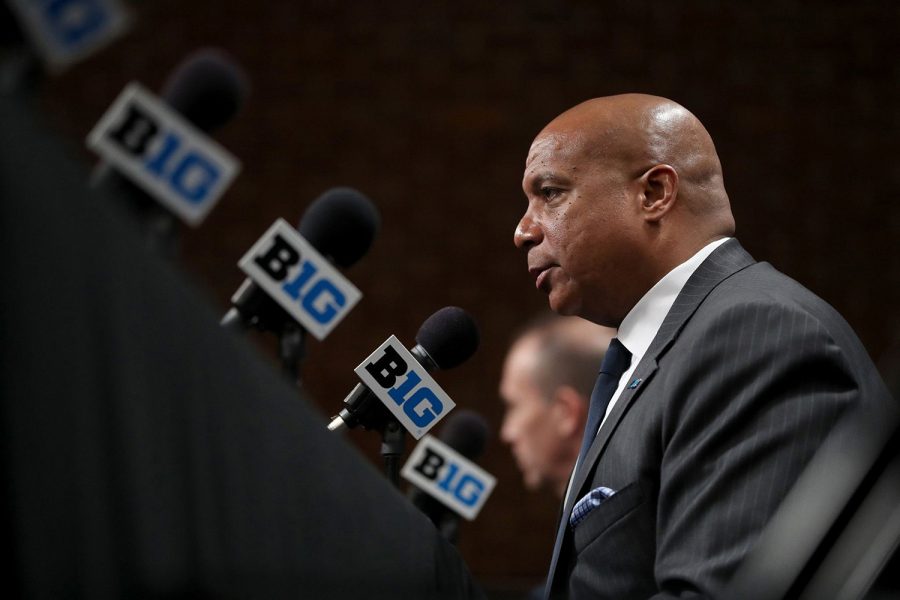Big Ten commissioner Kevin Warren speaks about the cancellation of the men’s basketball tournament at Bankers Life Fieldhouse in Indianapolis, Ind., on Thursday, March 12, 2020.
Point/Counterpoint | Did the Big Ten make the right call?
Two DI staffers debate the Big Ten’s decision to postpone fall sports.
August 25, 2020
Yes, they made the right call
The Big Ten and Commissioner Kevin Warren made the correct decision to postpone this year’s fall sports season.
Look at the professional sports leagues that have restarted recently amid the COVID-19 pandemic. The NBA and NHL have both established “bubble sites” for games, while the MLB has not. Which of those leagues has had the most trouble with COVID-19, resulting in canceled games? The MLB has, and now some experts fear it may not finish its season.
The only league that decided not to operate within a bubble system when it started its schedule is in jeopardy of losing its season, despite rigorous COVID-19 testing and prevention protocols.
How could we expect college athletes and teams — that can’t be put in a bubble because students have returned to campuses — to feel safe competing?
If an athlete was to even simply attend an in-person class and become infected by someone who was asymptomatic, then participate in a game against another school, the domino effect could begin. The virus spreading from an asymptomatic carrier to another person is rare, but a very real possibility.
The only way around the asymptomatic infection scenario would be for the Big Ten to mandate that every athlete as well as staff member is tested before every team activity, whether that be a game, practice, workout, in-person meeting, etc.
“All sports will be required to test a minimum of once weekly, while sports with high contact risk will be required to test a minimum of twice weekly. Required testing frequency is based upon the level of contact risk within the sport and is required for student-athletes as well as coaches and additional staff members,” The Big Ten stated in its COVID-19 Virus Testing Bulletin on Aug. 5.
This policy leaves gaps in testing that could allow the virus to spread.
So, until the Big Ten deems sporting events safe again, Hawkeye fans will just have to be happy watching old Iowa games on TV.
No, they made the wrong decision
Postponing fall sports was not the right decision for the Big Ten Conference to make.
While COVID-19 should be taken seriously, the right way to keep student-athletes safe is not through season cancelation. Under the watchful eye of the Big Ten and its various member athletic departments, student-athletes are kept safe via safety protocols the Big Ten implemented.
Under Big Ten protocol, athletes are tested at least once a week, medically evaluated on a daily basis, and contact-traced should they contract the virus. Regular students on campuses across the country aren’t receiving the same type of medical attention as student-athletes.
Student-athletes can also attend in-person classes and practice with their teams for 20 hours per week under current Big Ten guidelines. The risk of contracting the virus is still present for student-athletes in both the classroom and at the practice facility, as the virus does not differentiate between games, classes, or practice.
Eliminating games only expunges part of the risk. If the Big Ten was truly concerned about student-athlete safety, it would cancel all practices. And if universities were actually worried about students’ health, they would move all instruction online.
One last thing to consider is the student-athletes’ desire to compete. Many student-athletes have taken to Twitter recently to express their desire to compete this fall. Ohio State quarterback Justin Fields started a petition to have the Big Ten fall season reinstated. That petition already has over 300,000 signatures.
If student-athletes want to play, why shouldn’t they have the opportunity to do so? Sports are inherently dangerous; athletes accept that risk each day. If athletes want to play, the Big Ten should allow them to do so.
